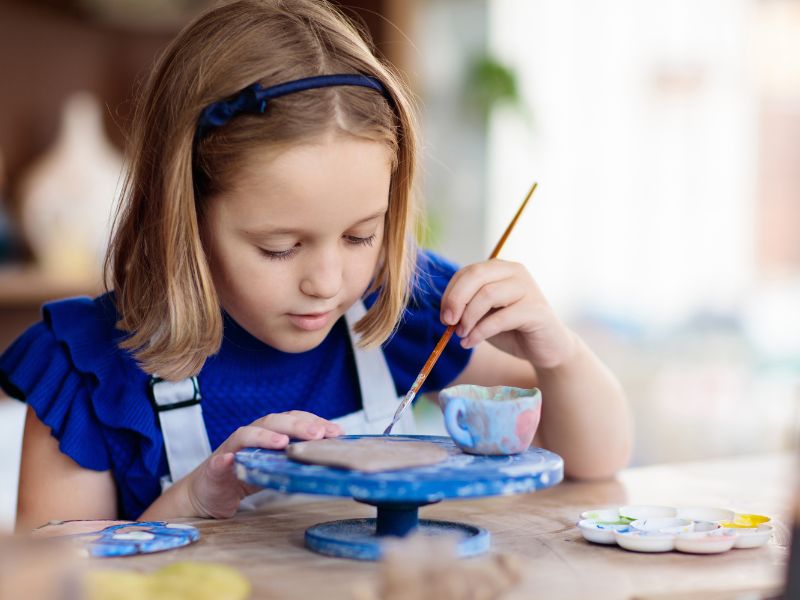Education is a significant step in a child’s growth. As a result, every parent wants to provide the best possible start for their children’s academic journey. Indeed, it plays a pivotal role in shaping your child’s cognitive, social, and emotional development while preparing them for the future. If you’re considering early education for your little one, here are six inspiring ideas for a great start.

1. Captivate their imagination with interactive storytelling
Storytelling is a powerful tool that has proven to spark curiosity in young minds and enhance language skills. You can make this step interactive in many ways, and that involves encouraging your child to participate actively in the storytelling.
A great way to start will be to ask open-ended questions like what they think will happen next or their thoughts on how the character in question feels. This line of questioning develops their comprehension and fosters critical thinking.
With a loved children’s story like “The Very Hungry Caterpillar,” ask your young one to predict what the caterpillar will eat next. Better yet, ask how they think the caterpillar might feel after eating a large meal.
The latter will likely trigger your child to conclude that excessive eating makes a person uncomfortable. What you would have done here is to set the foundation for your child to make valid conclusions from a lesson learned.
2. Engage all their senses with sensory play
Sensory play stimulates your child’s senses, helping them explore and understand the world around them. Although their comprehension of the world would initially be basic, that becomes the platform for learning through various senses.
Creating sensory bins with different materials like rice, sand, or water is a great start. Include objects that correspond with a specific theme or concept.
For instance, consider the simple elements you need when you are ready to introduce your child to birds and flying. The best way to engage your child’s senses is to fill a bin with colorful feathers, toy birds, and small branches, so feel free to consider this.
With these, you can let them have a feel of feathers and distinguish them from small branches and other things in the bin. In another breath, you can also introduce an immersive ocean-themed experience, requiring kinetic sand, seashells, and toy ocean animals, among others, to introduce a vivid understanding of marine life. Remember that children learn through play, and what better way to do this than by engaging them in sensory play?
Related Posts
3. Discover the wonders of the outdoors through nature walks
The outdoors is a great place for your child to play and learn. Let a child loose on the outdoors, and they will run from one end to the other, exploring their surroundings.
However, the objective here goes beyond the physical benefits of running. Instead, the aim is to broach the subject of nature and everything about it. Why not encourage your child to observe plants, insects, and animals in natural habitats? Let them discuss the colors, shapes, and textures they see outdoors.
While you’re promoting their scientific understanding of the world, it is also a great way to build their vocabulary. It would help if you take a sketchbook or journal, allowing your child to document their observations through simple drawings. Something like a ladybug is easy for your child to describe using its colors and distinct patterns.

4. Unleash your child’s creativity through artistic expression
Many children express themselves through art, and the drawings and paintings they produce hold so much meaning, saying a lot about their minds and interests.
Aside from being a great avenue for expression, art is also an excellent and fun way for your kids to develop fine motor skills. It is, therefore, not surprising to see many households with young children stocking up on art supplies like crayons, markers, and paints. It is good to encourage your young ones to draw, paint, or even create collages inspired by their favorite stories, animals, or objects.
Every child wants to be appreciated for their work, and you can show this by proudly displaying their artwork to reinforce confidence and a sense of achievement. Another way to build upon your child’s language skills is to encourage them to explain the story behind their art. The more you do this, the better their vocabulary gets, which will be beneficial for the formal school setting.
5. Introduce school lesson concepts through worksheets
If you’re considering a strong foundation for your child, starting from their early education is necessary. The more attuned your child becomes with school topics, the better it will be for enhanced comprehension.
Preschool children can start with kindergarten worksheets which have proven to be valuable resources for early education. These worksheets offer structured activities to help develop essential skills like counting, letter recognition, and problem-solving.
You will also find worksheets incorporating bright visuals and hands-on activities to ensure an interactive learning experience for your eager learner, so keep this in mind. If it’s your first time buying such worksheets, opt for those that combine counting and coloring activities. Your child can count the objects in a picture on those pages and color them accordingly, reinforcing their counting skills while nurturing their creativity.
6. Foster their imagination and social skills through pretend play
Before your preschooler enters the formal school setting, you will be responsible for building their social skills. You want them to fit in and feel comfortable with their peers, class attendants, and tutors. One way to develop this in your child is through pretend play, which allows children to explore different roles, scenarios, and interactions.
Some kids are naturally highly interactive, which can be a way to explore their full potential. Others will require a little coaching to open up in such settings, so keep this in mind. The tip, however, is not to force such children to engage in pretend games. Allow them to come into it at their time and convenience while you guide and encourage them.




